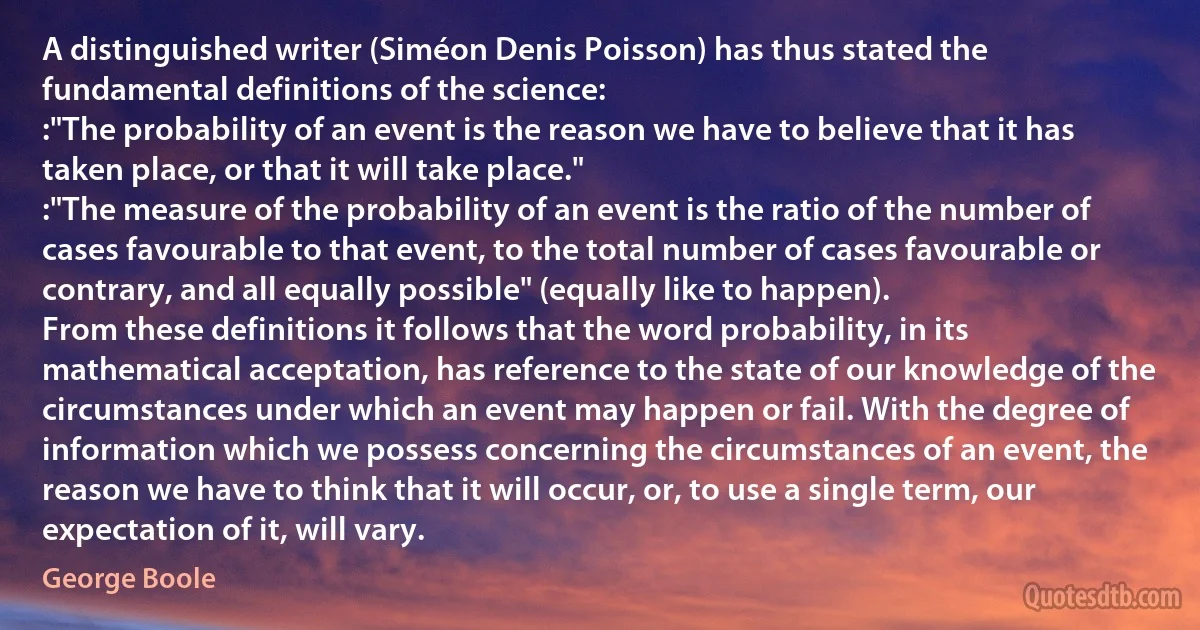
A distinguished writer (Siméon Denis Poisson) has thus stated the fundamental definitions of the science: :"The probability of an event is the reason we have to believe that it has taken place, or that it will take place." :"The measure of the probability of an event is the ratio of the number of cases favourable to that event, to the total number of cases favourable or contrary, and all equally possible" (equally like to happen). From these definitions it follows that the word probability, in its mathematical acceptation, has reference to the state of our knowledge of the circumstances under which an event may happen or fail. With the degree of information which we possess concerning the circumstances of an event, the reason we have to think that it will occur, or, to use a single term, our expectation of it, will vary.
George BooleRelated topics
acceptation believe degree fail fundamental knowledge measure number place possible probability ratio reason science single state take think thus under use word circumstancesRelated quotes
I believe that it is possible by means of horizontal and vertical lines, constructed 'consciously' but not 'calculating', guided by a higher intuition and brought to harmony and rhythm – I believe that these fundamental aesthetic shapes – where necessary supplemented by lines in other directions or curved lines, make it possible to arrive at a work of art which is as strong as it is true. For anyone who sees more deeply, there is nothing vague about this; it is only vague for the superficial observer of nature. And 'chance' must be as far removed as 'calculation'. And for the rest it seems to me that it is necessary to keep breaking off the horizontal or vertical line: for if these directions were not countered by others, they would themselves come to signify something 'specific' and thus human.

Piet Mondrian
I HAVE never met with a man, either in England or America, who hath not confessed his opinion, that a separation between the countries, would take place one time or other: And there is no instance, in which we have shewn less judgment, than in endeavouring to describe, what we call, the ripeness or fitness of the Continent for independance. As all men allow the measure, and vary only in their opinion of the time, let us, in order to remove mistakes, take a general survey of things, and endeavour, if possible, to find out the very time. But we need not go far, the inquiry ceases at once, for, the time hath found us. The general concurrence, the glorious union of all things prove the fact. It is not in numbers, but in unity, that our great strength lies; yet our present numbers are sufficient to repel the force of all the world.

Thomas Paine
We must first of all, however, definitely understand, in reference to the end we have in view, that it is not the concern of philosophy to produce religion in any individual. Its existence is, on the contrary, presupposed as forming what is fundamental in every one. So far as man s essential nature is concerned, nothing new is to be introduced into him. To try to do this would be as absurd as to give a dog printed writings to chew, under the idea that in this way you could put mind into it. It may happen that religion is awakened in the heart by means of philosophical knowledge, but it is not necessarily so. It is not the purpose of philosophy to edify, and quite as little is it necessary for it to make good its claims by showing in any particular case that it must produce religious feeling in the individual.

Georg Wilhelm Friedrich Hegel
For if experience has ever taught a truth, it is that a plurality in the supreme Executive will forever split into discordant factions, distract the nation, annihilate its energies, and force the nation to rally under a single head, generally an usurper. We have, I think, fallen on the happiest of all modes of constituting the Executive, that of easing and aiding our President, by permitting him to choose Secretaries of State, of Finance, of War, and of the Navy, with whom he may advise, either separately or all together, and remedy their divisions by adopting or controlling their opinions at his discretion; this saves the nation from the evils of a divided will, and secures to it a steady march in the systematic course which the President may have adopted for that of his administration.

Thomas Jefferson
The chief distinction in the intellectual powers of the two sexes is shewn by man attaining to a higher eminence, in whatever he takes up, than woman can attain - whether requiring deep thought, reason, or imagination, or merely the use of the senses and hands. If two lists were made of the most eminent men and women in poetry, painting, sculpture, music, - comprising composition and performance, history, science, and philosophy, with half-a-dozen names under each subject, the two lists would not bear comparison. We may also infer, from the law of the deviation of averages, so well illustrated by Mr. Galton, in his work on 'Hereditary Genius,' that if men are capable of decided eminence over women in many subjects, the average standard of mental power in man must be above that of woman. ... Thus man has ultimately become superior to woman.

Charles Darwin
